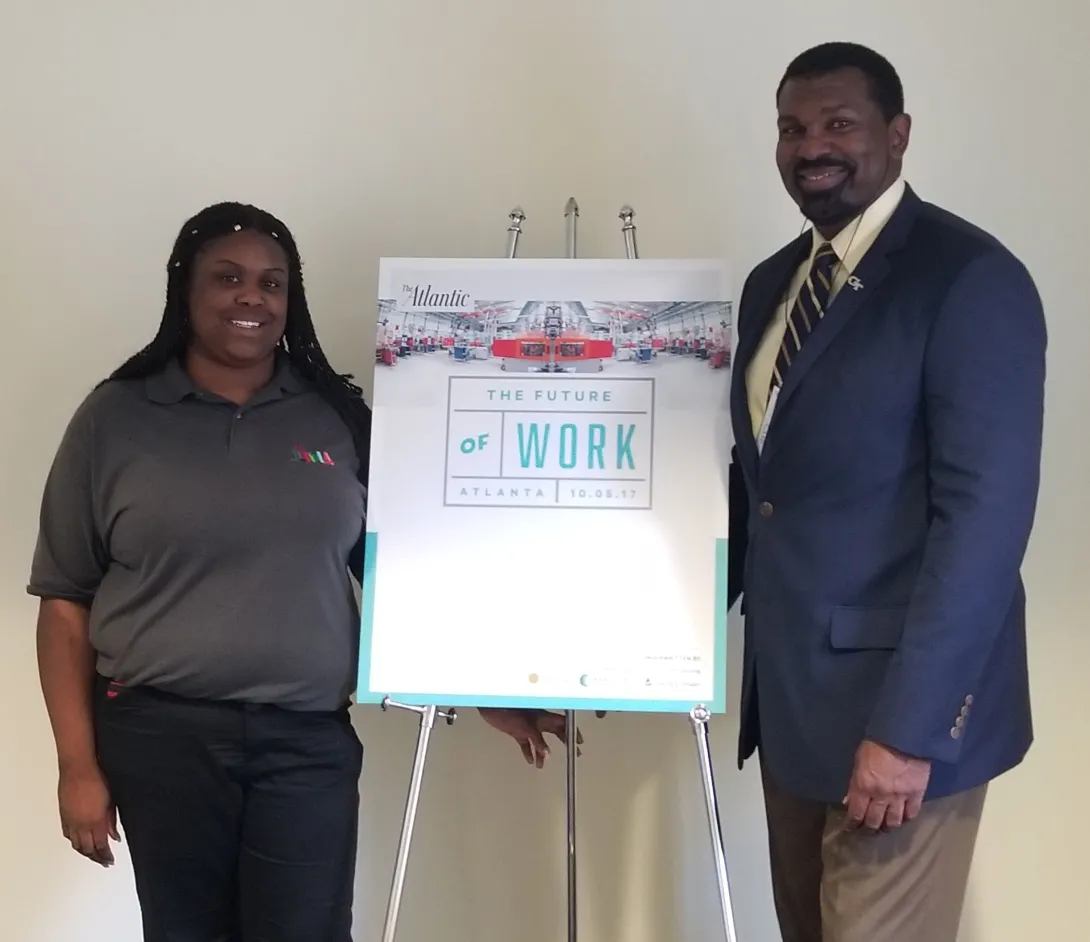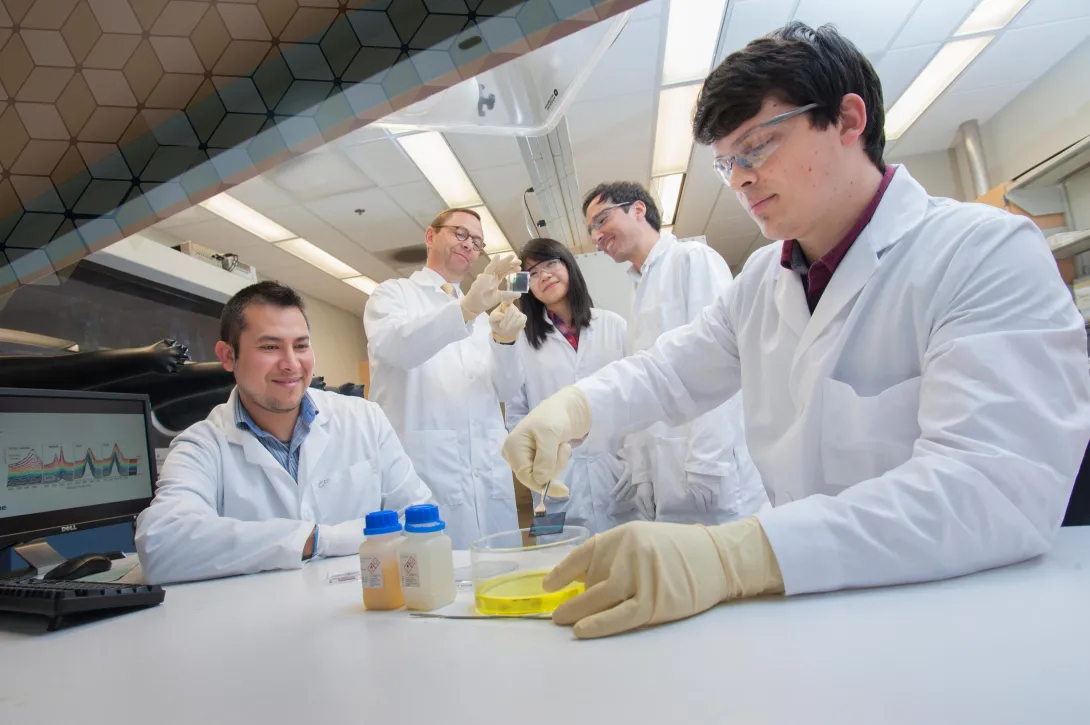Apr. 17, 2017
Devyon wasn't having success landing interviews or getting call backs for job applications. A mentor at the National Urban League encouraged him to apply to Juma, an employment and job training program which helps youth overcome the hardships of poverty and aspire to career success. As part of its social enterprise operations in Atlanta, Juma offers year-round employment to over 140 Atlanta youth at SunTrust Park, Mercedes-Benz Stadium, and State Farm Arena—home of the Braves, Falcons, Hawks, and Dream—as well as the Georgia World Congress Convention Center.
Devyon applied and successfully enrolled in Juma, and found a path to earn money, build his resume, and pave his future. As part of the program, Devyon took Georgia Tech LEAP courses to learn more about supply and logistics and the career paths the field has to offer. His dedication to the job, his willingness to go above what was expected of him and his attention to detail were characteristics that made him stand out to Juma’s Enterprise Managers. After successfully completing Juma’s training program, Devyon secured a job at UPS, a Juma Atlanta job placement partner. Today, Devyon has stable employment and, after successfully passing UPS’ Supervisor Exam, became a Shift Manager.
Oct. 09, 2017
Zaria participated in Juma, an employment and job training program which helps youth overcome the hardships of poverty and aspire to career success. As part of its social enterprise operations in Atlanta, Juma offers year-round employment to over 140 Atlanta youth at SunTrust Park, Mercedes-Benz Stadium, and State Farm Arena—home of the Braves, Falcons, Hawks, and Dream—as well as the Georgia World Congress Convention Center.
Zuma promotes participants to earn while they learn, so while going to school during the week to pursue her GED, Zaria took GT LEAP courses at night and worked in the Juma Atlanta concessions operations group on the weekend. Through perseverance and her will to succeed, she later secured fulltime employment within the JUMA organization.
At the Future of Work 2017 summit sponsored by The Atlantic, Zaria was asked about her experience. She commented, “sometimes, people just need a second chance and an opportunity to take advantage of it.” The experience has opened her eyes to the possibilities and Ms. Walker has aspirations to be a crime scene investigator. Zaria plan to pursue further education and make that dream a reality some day.
Dec. 09, 2019
On a journey for knowledge and self-development, Marine Corporal Phillip Davis completed the Supply Chain Management Principles, Customer Service Operations, Warehousing Operations, and Transportation Operations courses as part of the LEAP program.
“The courses have given me more tools towards helping build my critical thinking skills and the necessary skills and training to help me apply information about good supply chain management. It also gives me certainty in performing my duties as a Marines administrator to ensure required supplies and materials are delivered in a timely and right way.”
Corporal Davis commented that one day he would like to own his own business. By taking the LEAP courses, he has gotten closer to that goal through a better understanding of the importance of supply chain. “It helps me think about how to have things ready when and before people need them, to meet and exceed internal and external customers' demands. Being an administrator, there are things that I need to stay informed about, and acquiring awards, certificates help me do that. Responsibility wise, I constantly keep track of what we use, have and when we are down to half supplies. I put in orders for new supplies and replacement. The courses that I have taken definitely help me perform my duties at a high level above expectation. Overall, this program has helped me add on to my organization and accounting skills as in the military accountability is a big thing.”
Dec. 06, 2022
Todd Ullom has over 30 years' experience as an entrepreneur, developer, general contractor, technologist, and market strategist holding senior executive positions with both private and public companies. He is currently vice president for MiTek, a wholly owned subsidiary of Berkshire Hathaway, leading the development of the company’s distributed construction platform which is initially focused on offsite volumetric assembly of hotels. He joined MiTek as part of the acquisition of Innovation Builder, a technology company founded by Todd with a focus on solving the construction industry's toughest problems. Throughout his career, Todd has managed both growth and turnaround companies, developed new business opportunities, designed industry leading business processes and developed innovative marketing strategies. His experience includes founder and president of a bespoke building company; senior leadership positions in large private and public construction companies including COO, region president, VP of strategy and operations; and VP of strategy and business development for a technology firm.
Todd has developed more than $2.5 billion in real estate with annual P&L responsibility of more than $500 million and developed turnaround programs for over 50 projects during the financial crisis. He has developed industry leading processes for scheduling, purchasing and trade relationships. Todd created the Martha Stewart and Ralph Lauren branded home programs and has developed creative customer centric product designs and selling strategies. He has provided business and technology consulting for more than 200 builders and contractors of all sizes throughout North America. Todd has also served in numerous capacities constructing large scale commercial projects that include major medical research facilities, hospitals, dormitories, hotels and club houses.
Todd has a B.S. in Building Construction from the Georgia Institute of Technology, is a licensed Florida general contractor and sales associate, certified in advanced design thinking through IDEO and is a certified leadership coach with John Maxwell. He is a former president of the Atlanta Homebuilders Association, was named as one of Seattle’s Top Business Executives Under 40 in 1999, received the Lee Evans Award for Management Excellence in 2012, was named America’s Best Builder in 2013 and currently serves on the Board of Governors for the non-profit Opportunity International.
Nov. 21, 2022
Shreyes N. Melkote, who holds the Morris M. Bryan, Jr. Professorship in the George W. Woodruff School of Mechanical Engineering, has been awarded a $3 million Future Manufacturing Research Grant from the National Science Foundation (NSF). Melkote, who is also the Associate Director of the Georgia Tech Manufacturing Institute and Executive Director of the Novelis Innovation Hub, will act as principal investigator alongside four other researchers, including Woodruff School Professor Emeritus David Rosen, and will explore a data-driven approach to cyber manufacturing. The grant will also support Melkote’s efforts to work with academic and industry partners to develop educational tools to train a future manufacturing workforce from diverse backgrounds.
“We are excited to have the resources that the NSF has provided,” Melkote said. “It’s the best type of resource because it allows us to do basic research.”
Cyber manufacturing looks to leverage recent advances in artificial intelligence and machine learning, cloud technology and the expanding reach of the Internet-of-Things to reduce the cost and time of producing discrete parts. Presently, the manufacturing process is compartmentalized, with design, fabrication, and distribution heavily reliant on direct communication between the parties, and often involves multiple iterations of a design before the customer’s needs are met.
In a future cyber manufacturing ecosystem, the process is digitally unified across the supply chain and potential issues in fabrication can be flagged automatically and early in the design process, minimizing the need for multiple prototypes. The final design can then swiftly be routed to those best equipped to produce the product based on the specifications.
This vision of a fully automated, interconnected process has long been sought after and is considered the ‘holy grail’ of discrete parts manufacturing.
“It's an old problem,” Melkote said. “But we have new ways of potentially trying to solve it, and we have a critical mass of people and resources to help solve, or at least make a significant dent, in solving the problem.”
A crucial step in solving the problem requires digitizing and automating the complex series of decisions that begin when a new design for a product is completed. What are the manufacturing processes (and machines) required to produce the design? What processes create the most durable build, or the most cost-efficient? Can the design be altered for manufacturability without compromising functionality and quality?
For mass-produced discrete products or parts built to universal standards, these are questions to which suitable answers have been found through trial-and-error, but bespoke or new designs often require specialized knowledge about manufacturing processes and their capabilities. A company or individual will use their current level of understanding to discern how to move forward with a brand-new design.
“Fundamentally they are harnessing the knowledge derived from data they have tucked away somewhere and then using that to actually take a shot at figuring out how to make it,” Melkote explained. “But it would be great if they had all of these capabilities in an automated way. This grant is focused on how you generate the complex knowledge that individuals have acquired through experience.”
Melkote’s interdisciplinary approach will use generative machine learning and other artificial intelligence techniques to help automate this complex decision-making process. If a computer can infer the capabilities and limitations of an industrial manufacturing process and associated machines, then it should be able to make intelligent deductions about the entire manufacturing process, at least in theory. Extracting the data necessary to make this happen requires new methods that Melkote and his co-investigators will research.
“If I can teach a computer to be able to learn these things, the more data from successfully produced parts I can provide it, then its learning will improve and its ability to get close to telling me what all the types of things I can produce using a given process on a given machine will improve.”
The models and algorithms that would run this process could then be embedded in an automated cyber manufacturing service, which can analyze an uploaded design and provide a customer with instant feedback regarding recommended modifications, and projected costs, or even generate instructions and send them to the right machine. The work could see sweeping changes made to several manufacturing industries and democratize the way products are designed and made.
Alongside Rosen, Melkote will work closely with three other researchers, two of which have ties to Georgia Tech, including Matthew Gombolay, an assistant professor in the School of Interactive Computing, and Mahmoud Dinar, a former postdoctoral fellow at the Woodruff School and current Assistant Professor at California State University-Sacramento. Dr Gaurav Ameta, a research scientist at Siemens Corporate Technology will also work as co-principal investigator.
The grant is part of a wider national initiative that saw more than $30 million awarded to university-based research projects on advanced manufacturing and preparation of the manufacturing and STEM workforce for the future.
Article by Ian Sargent
News Contact
Nov. 21, 2022
The Georgia Tech Manufacturing Institute recently hosted its latest Internet of Things for Manufacturing (IoTfM) Symposium, focused on emerging IoT technologies in the manufacturing sector.
The yearly event was led by Andrew Dugenske, director of the Factory Information Systems (FIS) Center and a principal research engineer at Georgia Tech. Dugenske’s FIS Center focuses on advances in factory architectures, machine communication, cloud computing, edge devices, machine learning, artificial intelligence, overall equipment effectiveness and cybersecurity.
The event delivered fresh insights from more than 20 industry leaders. Speakers shared exclusive learnings from actual IoTfM implementations. Industry thought leaders, major manufacturers and respected experts participated in this year’s eighth annual symposium.
Presenters this year included representatives from Ford Motor Company, Kimberly-Clark, Autodesk, McKinsey & Company, Capgemini, ACS, QCells, Intuitus, Georgia Tech Manufacturing Institute, Georgia Department of Economic Development, University of New Hampshire, and researchers across Georgia Tech.
John Morehouse, director of manufacturing for the Georgia Center for Innovation commented, “Having companies present their use cases is so valuable to other manufacturers and the resources that want to support them.”
Missed the symposium? You can download and view all presentations by visiting the 2022 IoTfM symposium webpage.
The event was sponsored by the state of Georgia’s innovation and manufacturing group, the Georgia Tech Manufacturing Institute and the Georgia Tech Factory Information Systems Center.
To learn more or to join next year’s invitation list, contact Andrew Dugenske at dugenske@gatech.edu.
News Contact
Oct. 26, 2022
Joe Verbraska joined Steelcase in 1995 and currently serves as Director of Global Logistics. Throughout his 27-year career at Steelcase, Mr. Verbraska has worked as a Financial Analyst, led manufacturing operations in two of the largest plants for Steelcase North America, served as Director of Logistics Operations in Europe, and was Director of North American Logistics with responsibility for Transportation and Distribution. He has been instrumental in developing the logistics strategy for Steelcase, including creating and implementing the company’s distribution network.
Before joining Steelcase, Mr. Verbraska worked as a supply chain consultant at Accenture and held IT, finance and logistics roles at Whirlpool. Mr. Verbraska earned his bachelor’s degree in Information Systems at Ferris State University and his MBA from the University of Chicago.
Oct. 20, 2022
The North American Manufacturing Research Institution of SME (NAMRI | SME) has awarded their 2022 Outstanding Lifetime Service Award to Thomas R. Kurfess, professor in the George W. Woodruff School of Mechanical Engineering at Georgia Tech. Kurfess is the executive director of Georgia Tech’s Manufacturing Institute and holds the HUSCO/Ramirez Distinguished Chair in Fluid Power and Motion Control. SME was formerly known as the Society of Manufacturing Engineers. SME, headquartered in Southfield, Michigan, is a professional association dedicated to educating and promoting the manufacturing industry.
Kurfess, and two other Georgia Tech alumni were recognized at the 50th annual North American Manufacturing Research Conference (NAMRC) for their accomplishments in the manufacturing industry.
Georgia Tech alumni Thomas Feldhausen and Kyle Saleeby both received the Sandra L. Bouckley Outstanding Young Manufacturing Engineer Award. The award recognizes exceptional contributions in manufacturing made by engineers 35 or younger.
Kurfess first joined the faculty at Georgia Tech in 1994 and has taken on a variety of special assignments in addition to his teaching and research. From 2019-2021, Kurfess served as the chief manufacturing officer at ORNL, where he was responsible for strategic planning for ORNL in advanced manufacturing. He was also the founding director for ORNL's Manufacturing Science Division. He served as the assistant director for advanced manufacturing at the Office of Science and Technology Policy in the executive office of the President of the United States of America from 2012-2013, where he was responsible for coordinating federal advanced manufacturing research and development. He is the current executive director of the Georgia Tech Manufacturing Institute, having been appointed in June of 2022.
Previously, Kurfess was awarded the SME Albert M. Sargent Progress Award for the development of large-scale computing capabilities leveraging low-cost, high-performance computing systems to analyze large-scale manufacturing metrology data sets.
Kurfess is a member of the National Academy of Engineering and a fellow of the American Association for the Advancement of Science (AAAS), the American Society of Mechanical Engineers (ASME) and the Society of Manufacturing Engineers (SME). He was president of SME in 2018 and currently serves on the ASME Board of Governors.
For more information about these award winners, view the Woodruff School of Mechanical Engineering’s October 19, 2022 news release.
News Contact
Sep. 28, 2022
Advancement in technology brings about plenty of benefits for everyday life, but it also provides cyber criminals and other potential adversaries with new opportunities to cause chaos for their own benefit.
As researchers begin to shape the future of artificial intelligence in manufacturing, Georgia Tech recognizes the potential risks to this technology once it is implemented on an industrial scale. That’s why Associate Professor Saman Zonouz will begin researching ways to protect the nation’s newest investment in manufacturing.
The project is part of the $65 million grant from the U.S. Department of Commerce’s Economic Development Administration to develop the Georgia AI Manufacturing (GA-AIM) Technology Corridor. While main purpose of the grant is to develop ways of integrating artificial intelligence into manufacturing, it will also help advance cybersecurity research, educational outreach, and workforce development in the subject as well.
“When introducing new capabilities, we don’t know about its cybersecurity weaknesses and landscape,” said Zonouz. “In the IT world, the potential cybersecurity vulnerabilities and corresponding mitigation are clear, but when it comes to artificial intelligence in manufacturing, the best practices are uncertain. We don’t know what all could go wrong.”
Zonouz will work alongside other Georgia Tech researchers in the new Advanced Manufacturing Pilot Facility (AMPF) to pinpoint where those inevitable attacks will come from and how they can be repelled. Along with a team of Ph.D. students, Zonouz will create a roadmap for future researchers, educators, and industry professionals to use when detecting and responding to cyberattacks.
“As we increasingly rely on computing and artificial intelligence systems to drive innovation and competitiveness, there is a growing recognition that the security of these systems is of paramount importance if we are to realize the anticipated gains,” said Michael Bailey, Inaugural Chair of the School of Cybersecurity and Privacy (SCP). “Professor Zonouz is an expert in the security of industrial control systems and will be a vital member of the new coalition as it seeks to provide leadership in manufacturing automation.”
Before coming to Georgia Tech, Zonouz worked with the School of Electrical and Computer Engineering (ECE) and the College of Engineering on protecting and studying the cyber-physical systems of manufacturing. He worked with Raheem Beyah, Dean of the College of Engineering and ECE professor, on several research papers including two that were published at the 26th USENIX Security Symposium, and the Network and Distributed System Security Symposium.
“As Georgia Tech continues to position itself as a leader in artificial intelligence manufacturing, interdisciplinarity collaboration is not only an added benefit, it is fundamental,” said Arijit Raychowdhury, Steve W. Chaddick School Chair and Professor of ECE. “Saman’s cybersecurity expertise will play a crucial role in the overall protection and success of GA-AIM and AMPF. ECE is proud to have him representing the school on this important project.”
The research is expected to take five years, which is typical for a project of this scale. Apart from research, there will be a workforce development and educational outreach portion of the GA-AIM program. The cyber testbed developed by Zonouz, and his team will live in the 24,000 square-foot AMPF facility.
News Contact
JP Popham
Communications Officer | School of Cybersecurity and Privacy
Georgia Institute of Technology
jpopham3@gatech.edu | scp.cc.gatech.edu
Sep. 27, 2022
The Scalable Asymmetric Lifecycle Engagement Microelectronics Workforce Development program (SCALE) has announced the program will extend another five years and expand with $10.8 million additional Department of Defense (DoD) funding, with a ceiling of $99 million.
SCALE officials said this expansion of the nation’s preeminent program will further its goal to develop a next-generation workforce that can return the United States to prominence in global microelectronics manufacturing.
Georgia Tech participates in the partnership, which is led by Purdue University and managed by NSWC Crane. SCALE facilitates the training of highly skilled U.S. microelectronics engineers, hardware designers and manufacturing experts. SCALE brings together a public-private-academic partnership of 17 universities and 34 partners within the defense industry and government.
“This is an extremely exciting time in the country and at Tech for microchip design and manufacturing,” said Arijit Raychowdhury, the Steve W. Chaddick School Chair of Tech’s School of Electrical and Computer Engineering (ECE). “These newly announced funds for the SCALE program will help Georgia Tech recruit a new, diverse group of students ready to work in defense microelectronics. We’re thrilled to be a SCALE partner university and honored to be leading many of the project’s specialty areas.”
SCALE provides unique courses, mentoring, internship matching and targeted research projects for college students interested in five microelectronics specialty areas. Georgia Tech ECE faculty members will be the primary investigators for three of the areas:
- system on a chip will be led by Raychowdhury;
- radiation-hardening will be led by John Cressler;
- and heterogeneous integration/advanced packaging will be led by Madhavan Swaminathan.
The other two focus areas are embedded system security/trusted AI and supply chain awareness.
Industry and government partners regularly meet and update a list of knowledge, skills, and abilities important for new entrants to the workforce. The SCALE universities then update their curriculum to ensure the students are prepared for upcoming needs in the rapidly advancing microelectronics field.
Peter Bermel, SCALE director and the Elmore Associate Professor of Electrical and Computer Engineering at Purdue, said the United States will need 50,000 trained semiconductor engineers to meet overwhelming and rapidly growing demand.
“The United States is committed to expanding and strengthening its semiconductor industry and workforce rapidly over the next five years,” Bermel said. “SCALE takes a holistic approach to the microelectronics workforce gap by comprehensively addressing system challenges for workforce training and recruiting.”
Goals for the next five years include:
- Expanding student participation in SCALE fivefold to more than 1,000.
- Developing learning models for K-12 classrooms.
- Collaborating with community colleges nationwide to develop microelectronics classes.
The demand for microelectronics increased by 26.2% in 2021. But while the United States consumes about half of the chips produced worldwide, the country only manufactures about 12%, highlighting the pressing need for the U.S. to strengthen its domestic semiconductor supply chains and increase industrial capacity.
The funding announcement is the latest highlight in Georgia Tech’s leadership role in bolstering microelectronics and workforce development. Tech’s large engineering and science faculty bring a broad set of research expertise to strengthen the country’s semiconductor capacity. The Institute is uniquely positioned to train the microelectronics workforce, drive future microelectronics advances, and provide fabrication and packaging facilities for industry, academic and government partners to develop and test new solutions.
###
The Georgia Institute of Technology, or Georgia Tech, is a top 10 public research university developing leaders who advance technology and improve the human condition. The Institute offers business, computing, design, engineering, liberal arts, and sciences degrees. Its nearly 44,000 students, representing 50 states and 149 countries, study at the main campus in Atlanta, at campuses in France and China, and through distance and online learning. As a leading technological university, Georgia Tech is an engine of economic development for Georgia, the Southeast, and the nation, conducting more than $1 billion in research annually for government, industry, and society.
News Contact
Dan Watson
dwatson@ece.gatech.edu
Pagination
- Previous page
- 12 Page 12
- Next page










